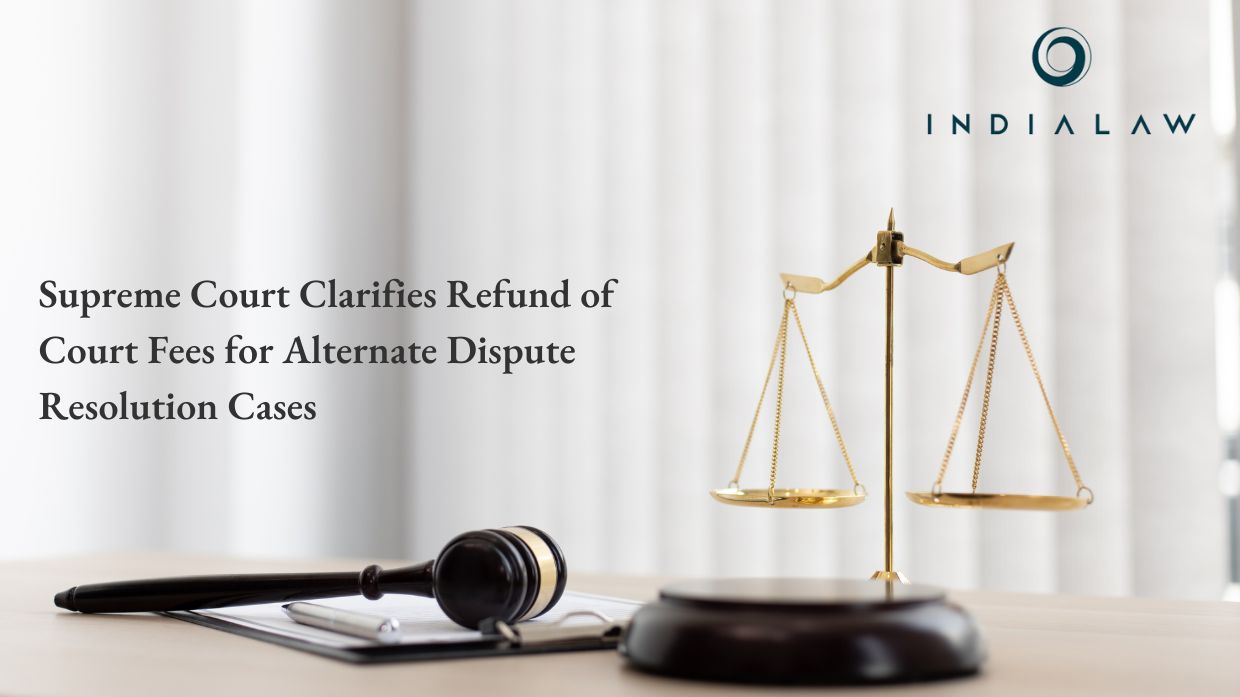Supreme Court Clarifies Refund of Court Fees for Alternate Dispute Resolution (ADR) Cases

In a significant judgment in the case of Sanjeevkumar Harakchand Kankariya v. Union of India & Ors., the Supreme Court addressed the nuanced issue of court fee refunds in cases resolved through Alternate Dispute Resolution (ADR) mechanisms such as mediation. The appellant sought clarity on whether litigants were entitled to a full refund of court fees under the Court Fees Act, 1870 (CFA) or if they were bound by state-specific laws such as the Maharashtra Court Fees Act, 1959 (MCFA).
This case involved a property dispute where the appellant had paid approximately ₹5 lakh in court fees for a civil suit that was later resolved through mediation under Section 89 of the Code of Civil Procedure (CPC). The trial court allowed a 50% refund of the court fees as per the provisions of the MCFA, 1959. However, the appellant contended that the CFA, 1870—a central legislation—provided for a full refund in such cases and should override the state law.
Table of Contents
The Legal Dilemma: Central vs. State Legislation
At the heart of the case was the question of legislative competence. The appellant argued that mediation, being an ADR mechanism recognized under Section 89 CPC, should be governed by central laws such as the CFA, 1870, which provides for a complete refund of court fees. The appellant also sought parity with settlements achieved through Lok Adalats, where refunds are mandated under the Legal Services Authorities Act, 1987 (LSA).
The Supreme Court, however, highlighted the constitutional framework for legislative competence:
- Court Fees Under State Jurisdiction: Court fees fall under Entry 3 of the State List in the Constitution’s Seventh Schedule. This gives state legislatures exclusive authority to enact laws on this subject.
- Doctrine of Harmonious Construction: In cases of conflict between central and state laws, state laws prevail in areas explicitly within the State List, provided there is no direct inconsistency or repugnancy.
The Court noted that the CFA, 1870, had been effectively repealed in Maharashtra by the MCFA, 1959. Therefore, refunds of court fees in Maharashtra were governed exclusively by the provisions of the MCFA, 1959, which allowed only a partial refund for cases settled through ADR mechanisms.
Distinguishing Between ADR Mechanisms
A significant part of the judgment focused on differentiating between Lok Adalats and mediation:
- Lok Adalats: Governed by the LSA Act, 1987, Lok Adalats operate as conciliatory bodies. Settlements reached through Lok Adalats are formalized as awards equivalent to court decrees. Under the LSA Act, litigants are entitled to a 100% refund of court fees for disputes resolved in Lok Adalats.
- Mediation: Mediation, on the other hand, is governed under Section 89 CPC. While it is a recognized ADR mechanism, it does not have a statutory mandate for a full refund of court fees under the CFA, 1870 or the MCFA, 1959.
The Court emphasized that Lok Adalats and mediation are distinct processes, and the provisions for court fee refunds applicable to Lok Adalats cannot be automatically extended to mediation.
Encouraging ADR While Upholding State Competence
The Supreme Court acknowledged the role of ADR mechanisms in reducing the burden on the judiciary and promoting efficient dispute resolution. It noted that incentives like court fee refunds encourage litigants to opt for ADR. However, it clarified that such refunds are incidental benefits and not the primary objective of ADR mechanisms.
The Court also highlighted the proactive approach of the Maharashtra legislature. In 2018, Maharashtra amended the MCFA, 1959 to include a provision allowing a 100% refund of court fees for disputes resolved through ADR mechanisms under Section 89 CPC. However, this amendment was prospective and did not apply to the appellant’s case.
Extraordinary Relief Under Article 142
While upholding the High Court’s decision to deny a full refund under existing laws, the Supreme Court exercised its extraordinary jurisdiction under Article 142 of the Constitution. It directed a full refund of the appellant’s court fees, considering the peculiar facts of the case and the amicable resolution of the original dispute. The Court made it clear that this relief was granted as an exception and would not serve as a precedent.
Conclusion
This judgment provides a clear interpretation of the interplay between central and state legislation on court fees. By distinguishing between Lok Adalat awards and mediation settlements, the Supreme Court reinforced the principle that state laws prevail in areas explicitly within the State List, such as court fees, provided there is no inconsistency with central laws.
The Court’s acknowledgment of Maharashtra’s legislative amendments to promote ADR mechanisms is a reminder of the importance of aligning legal frameworks to encourage efficient dispute resolution. The ruling strikes a balance between judicial equity and legislative intent, setting a roadmap for fostering ADR adoption while respecting legislative competence.
For further details write to contact@indialaw.in
By entering the email address you agree to our Privacy Policy.



